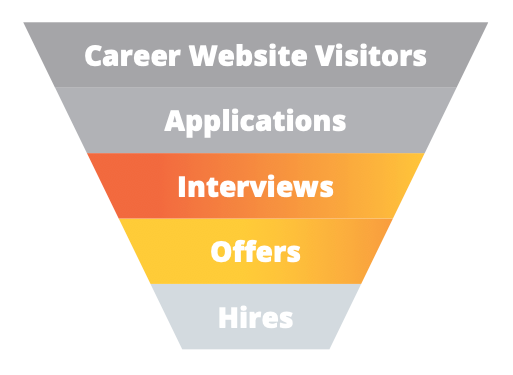
Been good at job interviews is in the best interests of anyone with a professional career. After some years of averaging an interview per week, I’m going to share my thoughts on the process and how to be good at it.
Why it’s important to be good at job interviews?
According to Jobvite statistics, only 17% of the people interviewed for a job receive an offer. That’s not a high number if you ask me.

In my opinion, interviews are where you make the difference. On the Application stage, you basically send the resume describing the experience you have and that’s it. Check out my post about an easy way to stand out when applying.
However, you can not express yourself through the PDF, and regardless of how good your resume is, you need to pass the interview.
Interviews are the central stage of the process. They saw some potential in you and want to talk to you to confirm it. They want to evaluate your personality to see if you are proactive, your technical skills to see if you can really do the job, and your cultural fit to see if you are the kind of person they are after.
However, the one that will get the most out of the process is you. You will learn about the company and the people working there. It’s a great chance to test yourself, to know what the market is looking for, and to get better at the process.
The key is to enjoy it

Lot’s of people hate job interviews. They find them terrifying, they know interviews are necessary, but they avoid them as much as they can. I admit I was scared, uncomfortable, and hated the situation at first.
With time, I learned to look at job interviews with other eyes that encouraged me to take more. I can guarantee if you apply correctly any of the following thoughts to your head, you will get better at job interviews.
Timing
People associate job interviews with stress. They are worried to fail, not get to the job offer, and to disappoint themselves.
I completely understand that. I have been in a situation where I needed a job, so it was really stressful and relevant to pass to the next stage. There is no way around that unless you are experienced and used to it.
What about when you don’t need a new job? I’m talking when you are happy where you are, enjoy your current position and satisfied with your salary.
You shouldn’t be worried at that point because you are perfectly fine where you are, or at least you don’t need a change. You are free to go out and apply for a better job or a desired position with more responsibilities. Nothing to lose and everything to win!
Try to get to the job offer, then you politely decline it or re-evaluate your situation.
There should be no problem if your current employer realizes you are taking job interviews. You can explain you are trying to get better at job interviews, and you are seeing what skills the market is looking for. I have been in this situation, and it only ended with positive outcomes.
Gamification
I love video games, grew up playing Age of Empires and Counter-Strike. I also enjoy sports. Football here in Argentina is super popular, as you know. The thing is, I like to be decent at those things, at least.
Unless you are the exception, nobody is great at anything the first time he tries it. You have to practice, get better, and level up your game. There are very competitive people out there practicing, and you can’t compete with them unless you do the same.
Interviewing is one of the most important games you should be playing, leave League of Legends on the side and start with this one instead. Being competitive in your career will give you far more satisfaction, and happiness.
You either success or learn
As you imagine, there will be times when you don’t get the job offer. It can be due to several things like you didn’t pass the technical part of the interview. Maybe you did but you don’t have experience managing people, for example. Or maybe you were asking for too much compensation.
Whatever the reason is, that time will come and you should embrace it and learn from it. Be prepared for failure. Don’t set high expectations for yourself until you hear the review.
Think of failure as a necessary step to improve.
If you failed due to technical knowledge, write it down. During the next couple of months, try to find a moment during the weekend to learn about that stuff. You don’t need to become an expert on the subject, just enough to defend yourself.
If you failed due to a lack of experience managing people, for example, you can re-think how can you express your desire to learn those soft skills. Show you are interested in the role and concerned. Read a book, I would suggest “One minute manager” or “The making of a manager”.
If you asked for too much compensation and they didn’t accept it, then you should keep an eye on the competition. What are people with your same set of skills asking for? What are the rest of the companies offering for a professional like you? Regardless of the answer, you should always ask yourself these questions.
Where to aim

It is no secrete that a job transition is a great opportunity for you to get a new role, new responsibilities, new skills, new experiences.
I’m not saying you should jump from companies often. Again, if you are comfortable where you are, and you don’t want to go anywhere, then you don’t have to. But it doesn’t mean you can not take an interview after two years at the same company.
This is personal, but when you realize there is nothing wrong with failing an interview, you may be interested in applying for a role that challenges you. To prove yourself.
Robert Kiyosaki, on his book “Rich Dad Poor Dad” says:
Rich people don’t work for money.
Neither should you. Work to get knowledge, skills, and experiences that will help you down the road, and will serve as tools for you to use. The money will eventually come, and if not, then you are going to have enough ammunition to go after it.
